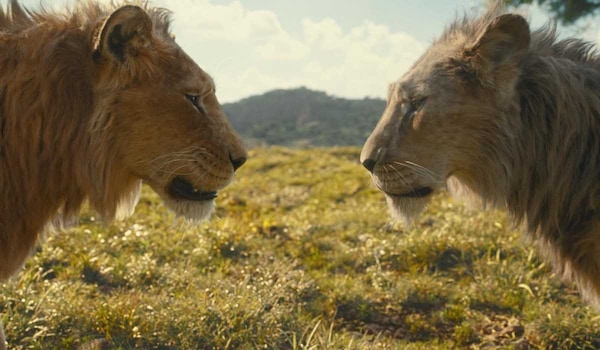Mufasa: The Lion King Review - Legendary beginnings, 'Scar'red by ordinary execution
Mufasa: The Lion King explores Scar's origins and Mufasa's rise, but the story gets lost in translation.

Last Updated: 07.56 PM, Dec 18, 2024
Mufasa: The Lion King story:
As the story of the Pride Lands' beloved monarch Mufasa unfolds in Mufasa: The Lion King, Timon and Pumbaa bring their trademark antics to the role of Rafiki as they tell the story of Mufasa to baby lion cub Kiara, who is the daughter of Simba and Nala. Flashbacks introduce an orphaned cub named Mufasa as abandoned and alone until he encounters a compassionate lion named Taka, who happens to be the heir to a royal lineage. A fortuitous encounter sets a remarkable band of outcasts on a perilous quest to discover their fate, testing their unity as they coordinate their efforts to outrun a dangerous enemy.
Mufasa: The Lion King review:
In a scene, Mufasa (voiced by Aaron Pierre) expresses his disinterest in becoming a king, while Simba (voiced by Donald Glover) in The Lion King aspires to become a king, a role that his magnificent father has generously bestowed upon him. In certain situations, nepotism operates in this manner, even though Simba overcame challenges from his uncle Scar (previously voiced by Chiwetel Ejiofor) in the 2019 film, ultimately ascending to become the rightful monarch. But in the latest film, Mufasa: The Lion King, we see that the titular character didn't deserve any of these given that he has been given the "outsider" tag. So how does Mufasa become the Lion King, and how did Taka, his adopted brother, become Scar? Well, I won't reveal any spoilers, but let's find out if it's a unique experience.
ALSO READ: Shah Rukh Khan reacts to son AbRam joining Mufasa: The Lion King; 'It just feels like...'
Barry Jenkins took the reins over Jon Favreau, who helmed the 2019 film, and this time he got the opportunity to translate the screenplay by Jeff Nathanson, all about the origin story. Despite the limited existence of the Pride Lands, the pride in every region's lions was evident; I hope you understand what I mean. To think that James Earl Jones hasn't voiced Mufasa before is heartbreaking. However, the film begins with his voice and a touching tribute to one of the greatest talents.
However, it's also reasonable to assume that this is Mufasa's backstory, and he hasn't yet become the Lion King. Pierre portrayed the character with a delicate touch, acknowledging the remorse he has endured since his family's separation from Taka's family. This also leads to him being a sacrificial lion who fears taking charge.
However, a connection to Taka is necessary to explain why Mufasa ascends to the throne. The villain origin story, as depicted in the promos, depicts them as best friends or brothers, with a song named I Always Wanted a Brother supporting this idea. However, Taka's family constantly creates division between them, believing that he lacks the strength to become a king and that someone more deserving could potentially usurp him.
Well, "blood is thicker than water" isn't always applicable when it comes to an underdog story. Every time a villain story arises, I can't help but think of Harvey Dent's line from The Dark Knight: "You either die a hero, or you live long enough to see yourself become the villain." In this case, the Scar story revolves around the aspiration to become a hero without sacrificing the main character's energy, as the world doesn't anticipate that "normal" can also mean "extraordinary."
However, this is where the story lacks depth, as the tale of Taka's transformation into Scar, the menacing villain, becomes entangled in the complexities of diplomacy, leaving neither character feeling emotionally invested. Little did I know I might be snoozing while watching because the straightforward story gets so straight that no twist leaves you with any shocker.
Until one of those Disney-favourite childhood traumas happens—a flood kills his father and sweeps Mufasa away to a faraway region—the cub lives peacefully with his family. There he meets Taka, the pampered princeling who will one day be Scar. As brothers, they endure each other's company through childhood—until yet another tragedy strikes. A pride of white lions known as the Outsiders invades their territory and kills Taka's father. While Mufasa is becoming a courageous and honourable leader, Taka is turning sour and dishonest as he flees.
That's the gist of it; as the final outcome demonstrates, many childhood traumas kick in and don't try to escape.
To be honest, problematically, photorealistic lions don't differ significantly from one another and don't have very expressive expressions. Since the lions in the 2019 film The Lion King were typically interacting with other species, their differences didn't really matter. However, the new film frequently features visually repetitive scenes where lions engage in conversation while pursuing each other. Also, it's not always straightforward to tell which lion is who. I had a difficult time, even though the colours were given differently, but it was of no help in wider shots or longer when pride came together to attack verbally and physically.
Pumba, along with Timon, attempts an excessive amount of comic relief in the film, uttering the phrase, "This story is killing me." Were they echoing the thoughts of the viewers? In the realm of diplomacy, the second part, a prequel, does nothing less than harm the already established story, which has become legendary for many.
Does Scar's role as a villain make sense? Um, no! Did it make you hate him further? Well, actually, not really. But that's not the point, and it didn't work because—what was the point even?
Mufasa: The Lion King verdict:
Despite noble efforts, this prequel doesn’t quite claw its way to greatness, leaving both Mufasa's legend and Scar's menace feeling a bit declawed. It’s a tale of pride, but not quite a crowning glory.
Subscribe to our newsletter for top content, delivered fast.

